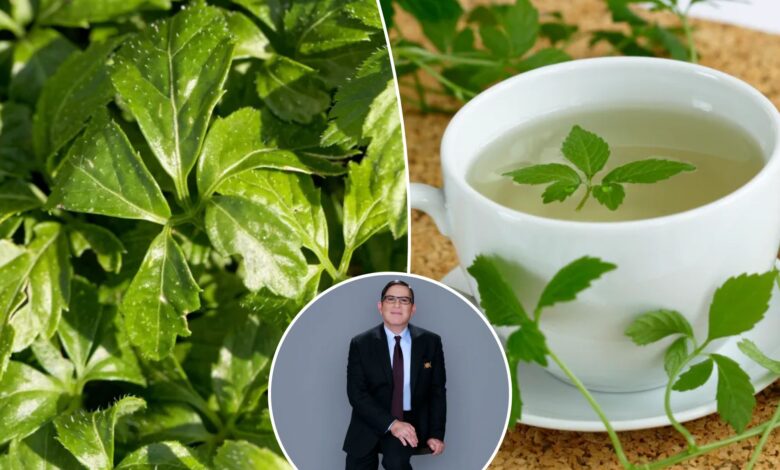‘Immortality herb’ may be more beneficial than green tea

Herb your enthusiasm!
You’ve heard of ginseng and ginkgo biloba — these Chinese herbs are widely used to enhance cognitive function, boost energy and reduce stress.
But you probably aren’t aware of jiaogulan. This lesser-known, so-called “immortality herb” is turning heads for its potential to increase metabolism, lower cholesterol and reduce inflammation while promoting longevity.
“Few people in the US know about it,” Dr. Michael Aziz, an NYC-based, board-certified internist and regenerative medicine specialist, told The Post.
Aziz, who consumes 900 daily milligrams of jiaogulan, spills the tea on the science behind the vining plant.
What is jiaogulan?
Jiaogulan, which grows in the mountainous and forested areas of Asia, is known officially as Gynostemma pentaphyllum and unofficially as “southern ginseng” or “miracle grass.”
Though it has been used in folk medicine for centuries, jiaogulan has really surged in popularity the last 10 years.
It’s primarily found in herbal tea and dietary supplements.
“Jiaogulan tea has a very high ORAC value (anti-oxidant capacity). It is eight times higher than what is found in green tea,” said Aziz, author of “The Ageless Revolution.”
Aziz suggests brewing one to two teaspoons of dried jiaogulan tea leaves in 250 milliliters of water, straining and serving.
He describes the taste as bitter but slightly sweet, while others call it “earthy.”
The bitterness stems from jiaogulan’s saponins, organic chemicals believed to hold the key to the plant’s health benefits.
“The bitter taste and cold nature of [jiaogulan] are particularly effective in clearing heat and detoxifying the body, making it beneficial for conditions such as viral hepatitis, chronic gastroenteritis, chronic bronchitis,” researchers wrote in the January edition of the Journal of Functional Foods.
“The sweet taste of [jiaogulan] nourishes the heart and protects the liver, benefits the qi and blood better and is more effective against hyperlipidemia, hypertension, fatty liver, insomnia and headaches.”
How does jiaogulan benefit health?
Jiaogulan contains gypenosides, a type of saponin.
Gypenosides are structurally similar to ginsenosides found in ginseng.
Gypenosides “stimulate AMP-activated protein kinase, an enzyme that plays a central role in maintaining cellular energy balance. They have antioxidant effects,” Aziz explained.
“They also improve insulin signaling and improve the function of mitochondria, which are the batteries of our cells,” he added. “Those are some of the hallmarks of aging that affect longevity.”
Aziz said jiaogulan has been shown to exhibit anti-cancer properties and help reduce blood pressure as well.
What are the potential side effects?
Jiaogulan is considered safe for consumption, Aziz said.
The most frequently reported side effects are nausea and diarrhea and less often, vomiting, dizziness, blurred vision or tinnitus.
People taking medications should consult with a healthcare provider before adding jiaogulan to their daily routine, as the supplement can interact with drugs.
“Diabetics should be careful and adjust their medications down with the help of their doctors if they drink massive amounts” of jiaogulan tea because it can lower blood sugar, Aziz advised.




